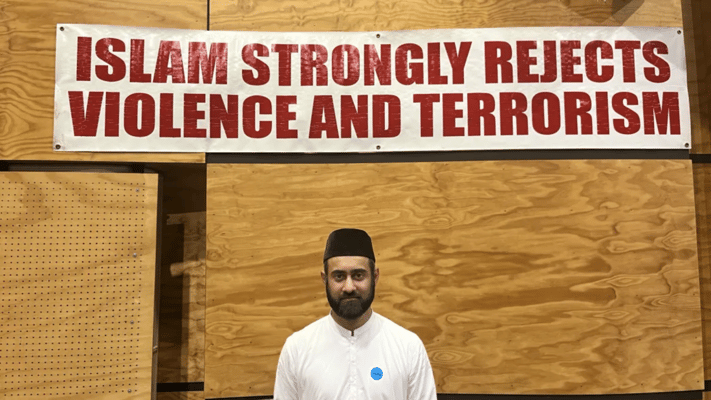Ahmadiyya Muslims Seek To Dispel Misconceptions About Islam

Hundreds gathered in Auckland last weekend to denounce violence at an annual convention organised by New Zealand's Ahmadiyya Muslim community.
The Ahmadi movement was founded in 1889 by Hadrat Mirza Ghulam Ahmad in British-controlled northern India.
Orthodox Muslims consider followers of the Ahmadi movement - called Ahmadiyyas - to be heretical as they do not believe the Prophet Muhammad was the final prophet sent to guide humanity.
The New Zealand branch of the community was established in 1987, with many members moving here as refugees after facing persecution overseas.
The community mainly settled in Auckland, Wellington, Nelson and Masterton, with the largest number making the City of Sails their new home.

Bashir Ahmed Khan is national president of Ahmadiyya Muslim Jamaat New Zealand. Photo: RNZ / Gaurav Sharma
"We now have three active missionaries in the country, and nine branches overall. The community is also present in the Pacific Islands, including Samoa, Niue, Cook Islands and Tokelau," said Bashir Ahmed Khan, national president of Ahmadiyya Muslim Jamaat New Zealand.
"Ours is a revivalist movement in Islam that seeks the establishment of universal human rights. We regularly raise our voice to promote peace and harmony amidst escalating conflicts. We engage regularly in disaster relief efforts the world over through independent charitable organisation Humanity First. In New Zealand, we regularly organise food parcels for the poor, and blood donation and cleanliness drives."
The New Zealand flag was hoisted alongside the community's flag during the Jalsa Salana 2025 convention "to show gratitude to a country that upholds religious freedom", the organisers said.
A special exhibition held on the sidelines of the convention showcased the life and teachings of the Prophet Muhammad and Hadrat Mirza Ghulam Ahmad, among other exhibits.
A keynote speech was delivered by Wellington-based Imam Mustenser Qamar, who highlighted "three universal principles that are embedded in the moral and spiritual framework of all major faiths as well as the conscience of humanity".
"These are absolute justice, elimination of greed and compassion," Qamar said. "We face wars, inequality and crisis when these principles are neglected."
Noting the overlap in teachings of all religions, Qamar called on inter-faith dialogues to clear misconceptions and misunderstanding about each other.
"Over the years, Ahmadiyyas in New Zealand have initiated campaigns such as 'Coffee, Cake and True Islam' and 'I'm a Muslim, Ask Me Anything'. This is our effort to educate the public on true and peaceful teachings of Islam," he said.
"Ignorance leads to misunderstandings, which can lead to negative perceptions and stereotyping. We want to change that and show people Muslims are no different."

"I'm a Muslim, Ask Me Anything" is a campaign by Ahmediyya Muslims that seeks to spread awareness about Islam. Photo: RNZ / Gaurav Sharma
The message resonated with Peter Mario, an academic who migrated to New Zealand 10 years ago from Fiji.
"Even though I am a Roman Catholic, I am here," Mario said. "This indicates [Ahmadiyyas'] efforts in removing misconceptions about Islam are bearing fruit. Islam means peace, which I know and understand now."
Nik Naidu, also from Fiji, praised the charitable work done by Ahmadiyyas in New Zealand.
"Ahmadiyyas stress on in inter-faiths discussions is praiseworthy, as is their commitment to serving humanity," Naidu said. "Hundreds benefit from the free food parcels they distribute regularly."
Qamar closed the conference by calling on the gathering as well as members of other faiths to end intolerance, which he said was the root of all conflicts.
"Our founder worked for social peace and harmony among all religions," Qamar said. "He condemned all forms of violence, long before terrorism became a global concern.
"Together, with our collective efforts, we can light the lamp of peace and ensure it never dims."
Hundreds gathered in Auckland last weekend to denounce violence at an annual convention organised by New Zealand's Ahmadiyya Muslim community.
The Ahmadi movement was founded in 1889 by Hadrat Mirza Ghulam Ahmad in British-controlled northern India.
Orthodox Muslims consider followers of the Ahmadi...
Hundreds gathered in Auckland last weekend to denounce violence at an annual convention organised by New Zealand's Ahmadiyya Muslim community.
The Ahmadi movement was founded in 1889 by Hadrat Mirza Ghulam Ahmad in British-controlled northern India.
Orthodox Muslims consider followers of the Ahmadi movement - called Ahmadiyyas - to be heretical as they do not believe the Prophet Muhammad was the final prophet sent to guide humanity.
The New Zealand branch of the community was established in 1987, with many members moving here as refugees after facing persecution overseas.
The community mainly settled in Auckland, Wellington, Nelson and Masterton, with the largest number making the City of Sails their new home.

Bashir Ahmed Khan is national president of Ahmadiyya Muslim Jamaat New Zealand. Photo: RNZ / Gaurav Sharma
"We now have three active missionaries in the country, and nine branches overall. The community is also present in the Pacific Islands, including Samoa, Niue, Cook Islands and Tokelau," said Bashir Ahmed Khan, national president of Ahmadiyya Muslim Jamaat New Zealand.
"Ours is a revivalist movement in Islam that seeks the establishment of universal human rights. We regularly raise our voice to promote peace and harmony amidst escalating conflicts. We engage regularly in disaster relief efforts the world over through independent charitable organisation Humanity First. In New Zealand, we regularly organise food parcels for the poor, and blood donation and cleanliness drives."
The New Zealand flag was hoisted alongside the community's flag during the Jalsa Salana 2025 convention "to show gratitude to a country that upholds religious freedom", the organisers said.
A special exhibition held on the sidelines of the convention showcased the life and teachings of the Prophet Muhammad and Hadrat Mirza Ghulam Ahmad, among other exhibits.
A keynote speech was delivered by Wellington-based Imam Mustenser Qamar, who highlighted "three universal principles that are embedded in the moral and spiritual framework of all major faiths as well as the conscience of humanity".
"These are absolute justice, elimination of greed and compassion," Qamar said. "We face wars, inequality and crisis when these principles are neglected."
Noting the overlap in teachings of all religions, Qamar called on inter-faith dialogues to clear misconceptions and misunderstanding about each other.
"Over the years, Ahmadiyyas in New Zealand have initiated campaigns such as 'Coffee, Cake and True Islam' and 'I'm a Muslim, Ask Me Anything'. This is our effort to educate the public on true and peaceful teachings of Islam," he said.
"Ignorance leads to misunderstandings, which can lead to negative perceptions and stereotyping. We want to change that and show people Muslims are no different."

"I'm a Muslim, Ask Me Anything" is a campaign by Ahmediyya Muslims that seeks to spread awareness about Islam. Photo: RNZ / Gaurav Sharma
The message resonated with Peter Mario, an academic who migrated to New Zealand 10 years ago from Fiji.
"Even though I am a Roman Catholic, I am here," Mario said. "This indicates [Ahmadiyyas'] efforts in removing misconceptions about Islam are bearing fruit. Islam means peace, which I know and understand now."
Nik Naidu, also from Fiji, praised the charitable work done by Ahmadiyyas in New Zealand.
"Ahmadiyyas stress on in inter-faiths discussions is praiseworthy, as is their commitment to serving humanity," Naidu said. "Hundreds benefit from the free food parcels they distribute regularly."
Qamar closed the conference by calling on the gathering as well as members of other faiths to end intolerance, which he said was the root of all conflicts.
"Our founder worked for social peace and harmony among all religions," Qamar said. "He condemned all forms of violence, long before terrorism became a global concern.
"Together, with our collective efforts, we can light the lamp of peace and ensure it never dims."










Leave a Comment